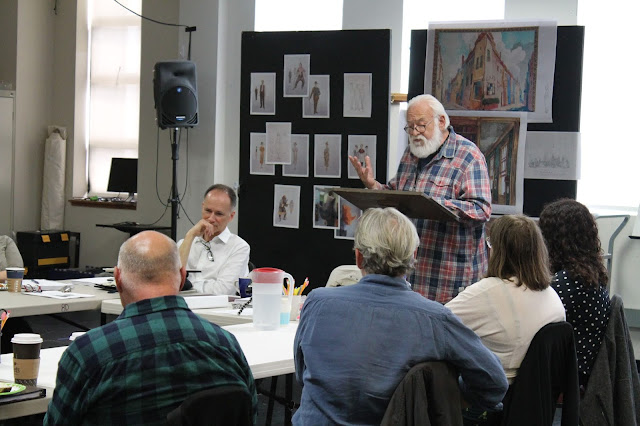Rhinos Roaming Through Our Psychological Savannas
By Annie Sears
At the first rehearsal for Rhinoceros, director Frank Galati reminded the cast, crew, and A.C.T. staff that during the 1930s and ’40s, playwright Eugène Ionesco watched his friends succumb to popular political beliefs. In his memoir, Ionesco recalls chatting with his friends—university professors, students, journalists, critics, and other intellectuals—to dismantle fascist propaganda. All but three of those friends eventually changed their allegiance, even those who had claimed to be fascism's firmest opponents. To Ionesco, these friends were “pseudo-intellectuals” because they didn’t truly think; instead, they regurgitated predominant systems of thought. “They were caught in the mechanism,” wrote Ionesco. “They accepted everything. They became rhinoceroses.”
Absurdist theater artists such as Ionesco believed that fascist ideologies were propelled primarily by language, which could be manipulated into propaganda. Those who spouted fascist slogans would do so repeatedly, until the phrases became clichés and the proponents ceased to consider what they were saying. “Fascists despised the small truths of daily existence,” says Galati, “loved slogans that resonated like a new religion, and preferred creative myths to history or journalism. They used new media—which at the time was radio—to create a drumbeat of propaganda that aroused feelings before people had time to ascertain facts. Now as then, many people confused faith in hugely flawed leaders with the truth about the world we all share.”
This is why absurdist theater is, well, absurd. To prove that language is an insufficient vehicle for communication, absurdist plays abandon traditional language structures for incoherent and circular dialogue. Characters don't need to act with clear motivation, and the plot doesn’t need to follow a cause-and-effect structure. Like a dream, absurdist plays follow a sort of logic, but it’s a logic outside waking reality and unique to the world of the play. Anything can happen—including people transforming into rhinoceroses.
But perhaps the absurd isn’t so absurd after all. “The rhinoceros are roaming through our psychological savannas to this day,” says Galati. “That is why nothing in our own world would startle Ionesco. It’s a thrilling opportunity to be given the chance to tell this story to this citizenry. Here. Now.”
Want to learn more about Ionesco’s career, Galati’s vision for this production, and the themes at play in Rhinoceros? Get your copy of Words on Plays, available in the box office, the lobby, or online. And experience the spectacle for yourself by joining us for Rhinoceros—beginning May 29 at The Geary.
At the first rehearsal for Rhinoceros, director Frank Galati reminded the cast, crew, and A.C.T. staff that during the 1930s and ’40s, playwright Eugène Ionesco watched his friends succumb to popular political beliefs. In his memoir, Ionesco recalls chatting with his friends—university professors, students, journalists, critics, and other intellectuals—to dismantle fascist propaganda. All but three of those friends eventually changed their allegiance, even those who had claimed to be fascism's firmest opponents. To Ionesco, these friends were “pseudo-intellectuals” because they didn’t truly think; instead, they regurgitated predominant systems of thought. “They were caught in the mechanism,” wrote Ionesco. “They accepted everything. They became rhinoceroses.”
 |
| Director Frank Galati addresses the cast and crew of Rhinoceros at the first rehearsal. Photo by Elspeth Sweatman. |
Absurdist theater artists such as Ionesco believed that fascist ideologies were propelled primarily by language, which could be manipulated into propaganda. Those who spouted fascist slogans would do so repeatedly, until the phrases became clichés and the proponents ceased to consider what they were saying. “Fascists despised the small truths of daily existence,” says Galati, “loved slogans that resonated like a new religion, and preferred creative myths to history or journalism. They used new media—which at the time was radio—to create a drumbeat of propaganda that aroused feelings before people had time to ascertain facts. Now as then, many people confused faith in hugely flawed leaders with the truth about the world we all share.”
This is why absurdist theater is, well, absurd. To prove that language is an insufficient vehicle for communication, absurdist plays abandon traditional language structures for incoherent and circular dialogue. Characters don't need to act with clear motivation, and the plot doesn’t need to follow a cause-and-effect structure. Like a dream, absurdist plays follow a sort of logic, but it’s a logic outside waking reality and unique to the world of the play. Anything can happen—including people transforming into rhinoceroses.
But perhaps the absurd isn’t so absurd after all. “The rhinoceros are roaming through our psychological savannas to this day,” says Galati. “That is why nothing in our own world would startle Ionesco. It’s a thrilling opportunity to be given the chance to tell this story to this citizenry. Here. Now.”
Want to learn more about Ionesco’s career, Galati’s vision for this production, and the themes at play in Rhinoceros? Get your copy of Words on Plays, available in the box office, the lobby, or online. And experience the spectacle for yourself by joining us for Rhinoceros—beginning May 29 at The Geary.

